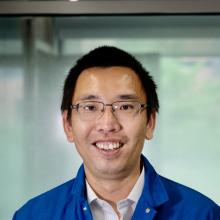IMSE Seminar with Feng Jiao on CO2 Electrolysis Systems
Our research group is currently dedicated to the development of CO2 electrolysis devices that convert CO2 into value-added chemicals and fuels through innovative electrocatalyst design and reactor engineering. In this presentation, we will showcase our recent work on a two-step tandem CO2 electrolysis system. We have reported an internally coupled purification strategy that significantly enhances acetate concentration and purity in CO electrolysis.[1] This approach employs an alkaline-stable anion exchange membrane with high ethanol permeability and a selective ethanol partial oxidation anode to regulate the CO reduction product stream.
We successfully demonstrated a stable 120-hour continuous operation of the CO electrolyzer at a current density of 200 mA cm-2 and a full-cell potential of less than 2.3 V, consistently producing a 1.9 M acetate product stream with a purity of 97.7%. This performance is among the best reported in the literature. The ability to convert CO2 into acetate has opened up the possibility of developing an electrochemical-biological hybrid approach to produce food from CO2, offering much higher efficiency than natural photosynthetic pathways.[2]
References:
- S. Overa, B. Crandall, B. Shrimant, D. Tian, B. H. Ko, H. Shin, C. Bae and F. Jiao*. Enhancing acetate selectivity by coupling anodic oxidation in carbon monoxide electroreduction. Nature Catalysis 5, 738-745 (2022). 10.1038/s41929-022-00828-w
- E. C. Hann, S. Overa, M. Harland-Dunaway, A. F. Narvaez, D. N. Le, M. L. Orozco-Cardenas, F. Jiao* and R. E. Jinkerson*. A hybrid inorganic-biological artificial photosynthesis system for energy-efficient food production. Nature Food 3, 461 (2022). 10.1038/s43016-022-00530-x
Professor Feng Jiao holds a BS in chemistry from Fudan University in China and a PhD in chemistry from the University of St Andrews in the United Kingdom. Following the completion of his postdoctoral training at the Lawrence Berkeley National Laboratory, he joined the faculty at the University of Delaware in 2010 and served as a Professor of Chemical and Biomolecular Engineering and as the Director of the Center for Catalytic Science & Technology. He joined the Washington University in St. Louis, Department of Energy, Environmental & Chemical Engineering in August 2023. The Jiao research group is dedicated to developing innovative electrochemical devices to address critical energy storage and sustainability challenges. Professor Jiao has published over 100 research papers, which have collectively received more than 16,000 citations. His contributions have been recognized with several awards and honors, including his election as a Fellow of the Royal Society of Chemistry, the receipt of the NSF CAREER Award, and recognitions as a 2020 Emerging Investigator by the Journal of Materials Chemistry A and a 2020 Scialog Fellow for the Negative Emission Science (NES) initiative.
Faculty, students, and the general public are invited.


